

Write or Die 2. The Bunker Diary. I am reading my way through the 2014 Carnegie Medal shortlist.
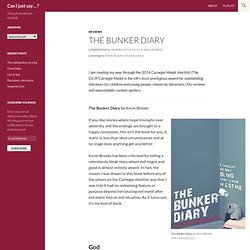
(The CILIP Carnegie Medal is the UK’s most prestigious award for outstanding literature for children and young people, chosen by librarians.) My reviews will unavoidably contain spoilers. The Bunker Diary by Kevin Brooks The Bunker Diary by Kevin Brooks978-0141326122 If you like stories where hope triumphs over adversity and the endings are brought to a happy conclusion, this isn’t the book for you. Kevin Brooks has been criticised for telling a relentlessly bleak story where evil reigns and good is almost entirely absent. God Good books don’t just entertain; they make you think. Our protagonist Linus is cast into an underground bunker cut off from the outside world (except for a lift that arrives once a day to bring deliveries and later leaves with whatever those in the bunker want to send up to the surface).
So far, so vindictive-God-preys-on-helpless-humanity. Humanity. CALLIHOO Writing Idea Generators: The 37 Dramatic Situations. The Thirty-six (plus one) Dramatic Situations Georges Polti says that all stories boil down to just 36 dramatic situations and takeoffs of those situations.
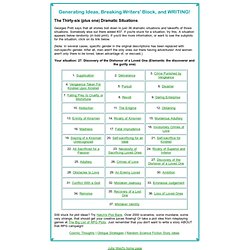
Somebody else out there added #37. If you're stuck for a situation, try this. A situation appears below randomly (in bold print). 25 Reasons Readers Will Keep Reading Your Story. I want to be clear: what this should really be titled is, “What Keeps Chuck Reading.”
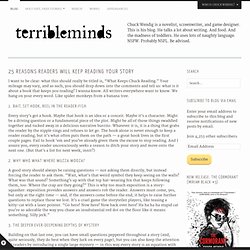
Your mileage may vary, and as such, you should drop down into the comments and tell us: what is it about a book that keeps you reading? I wanna know. All writers everywhere want to know. We hang on your every word. Like spider monkeys from a banana tree. 1. Every story’s got a hook. 2. A good story should always be raising questions — not asking them directly, but instead forcing the reader to ask them. 3. Building on that last one, you can have small questions peppered throughout a story (and, quite seriously, they do best when they lurk on every page), but you can also keep the attention of readers by introducing a single large mystery — in this way every story is an equation with some numerals replaced with variables, and the audience hungers to fill in the variables and complete the equation.
What Makes a Character Unlikable? Believe it or not, I sometimes actually follow my own advice.
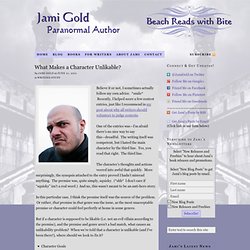
*smile* Recently, I helped score a few contest entries, just like I recommend in my post about why all writers should volunteer to judge contests. One of the entries was—I’m afraid there’s no nice way to say this—dreadful. The writing itself was competent, but I hated the main character by the third line. Yes, you read that right. The third line. The character’s thoughts and actions veered into awful that quickly. In this particular case, I think the premise itself was the source of the problem. But if a character is supposed to be likable (i.e. not an evil villain according to the premise), and the premise and genre aren’t a bad match, what causes an unlikability problem?
Character Goals What do they want? Character Behaviors Does the character come off as whiny? Character Actions Obviously, a character who kills kittens isn’t going to be liked, but sometimes this is more subtle. Random Plot Generator. StoryStarter - Telling your story in 7 steps. Ready to start your story?
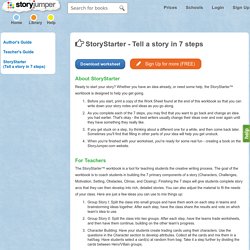
Whether you have an idea already, or need some help, the StoryStarter™ workbook is designed to help you get going. The StoryStarter™ workbook is a tool for teaching students the creative writing process. The goal of the workbook is to coach students in building the 7 primary components of a story (Characters, Challenges, Motivation, Setting, Obstacles, Climax, and Closing). Finishing the 7 steps will give students complete story arcs that they can then develop into rich, detailed stories. You can also adjust the material to fit the needs of your class.
Let's get started! Your character doesn't have to be human. Is your character usually happy, or gloomy? Witty Remarks. Everyone can be straightforward.

It's being witty that adds a little spice to it Be it at work, or in a relationship, a little wit is always appreciated. Moreover, it takes a sense of humor to understand it.